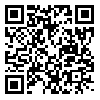BibTeX | RIS | EndNote | Medlars | ProCite | Reference Manager | RefWorks
Send citation to:
URL: http://ijme.tums.ac.ir/article-1-5630-en.html
2- Nursing Ethics Department, Medical Ethics and Law Research Center, Shahid Beheshti University of Medical Sciences, Tehran, Iran;
3- Nursing Ethics Department, Medical Ethics and Law Research Center, Shahid Beheshti University of Medical Sciences, Tehran, Iran
In the nursing profession, ethical practice is contingent upon the nurses’ ability to determine the ethical issues in their vocation, and their sensitivity to these issues in the nurse-patient relationship. In order for the health system to have a strong and solid foundation, this sensitivity must be formed in nursing students during the early stages of their education. Educational environment and clinical experience each affect ethical sensitivity in their own way. The purpose of this study was to determine and compare the ethical sensitivity of third and fourth year nursing students and nurses in Islamic Azad University, Mashhad branch during 2014.
In this cross-sectional study Lutzen’s Moral Sensitivity Questionnaire was used, and its validity and reliability was confirmed. According to the formula for sample size, 110 persons were sampled in each group. Sampling was performed randomly among the third and fourth year students, and in two stages among the nurses: first cluster, and then randomly. Data were analyzed using descriptive and analytical statistics by SPSS software.
The mean and standard deviation of moral sensitivity was 3.33 ± 0.36 in nursing students, and 3.27 ± 0.35 in nurses, and the independent t-test showed no significant difference between the two groups (df = 218, t = -1.06, P > 0.05). Moreover, there was no statistically significant difference between the mean scores of moral sensitivity based on demographic characteristics.
It was concluded that the ethical sensitivity of nurses and nursing students of Islamic Azad University, Mashhad branch was satisfactory, which can be considered as a point of strength for policy makers of the health system.
Received: 2015/11/17 | Accepted: 2016/02/15 | Published: 2016/02/15
| Rights and permissions | |
 |
This work is licensed under a Creative Commons Attribution-NonCommercial 4.0 International License. |





